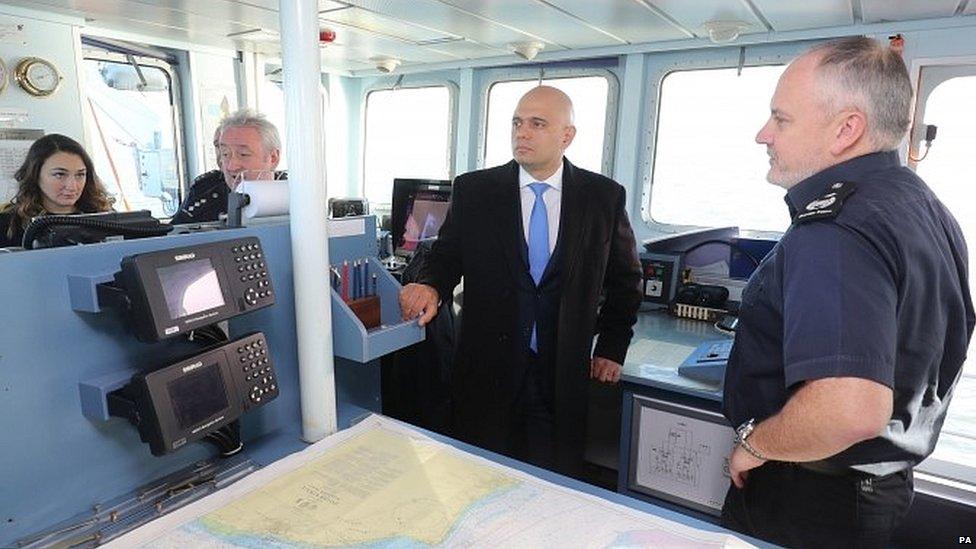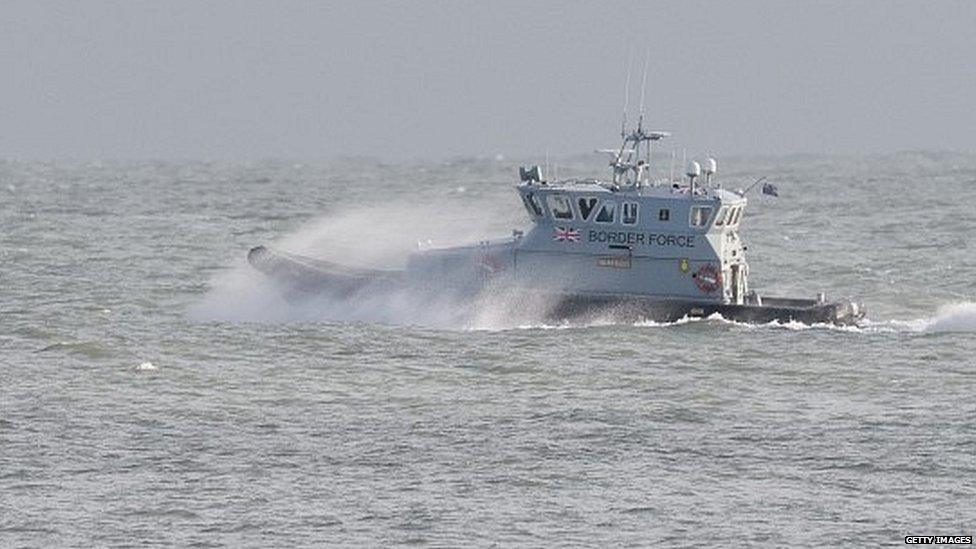Sajid Javid under fire over Channel migrant comments
- Published

Sajid Javid has faced criticism after questioning whether people risking their lives crossing the English Channel are "genuine" refugees.
During a visit to Dover, the home secretary defended his call to declare a major incident last week and redeploy patrol vessels from the Mediterranean.
He suggested those seeking asylum in the UK should have done so in France or elsewhere on the continent.
Opposition MPs and campaigners called the comments "deeply concerning".
While the UK would process asylum applications in the normal way, Mr Javid said he wanted to send a "strong message" that economic migrants would not be allowed to illegally settle in the UK.
Twelve migrants were found on the Kent coast last week, bringing the total number of people to have reached the UK by boat since November to 239.
French police said they stopped 14 migrants attempting to cross the channel from Boulogne on Tuesday, the latest in a growing number of people intercepted by the French authorities in the past month.
Mr Javid has defended escalating the UK's response, saying 80% of the 539 people who had attempted to cross the Channel in small boats in 2018, had done so since October.
Sorry, your browser cannot display this map
After going out on patrol on HMC Searcher, he said bringing two further patrol vessels back to the English channel would "make a big difference" in protecting human life, as well as securing the UK's borders.
"We have seen a real step-change in attempts in the last three months," he said.
While the UK would consider asylum applications from those seeking sanctuary in the UK, he suggested a tough line would be taken on economic migrants, so as to send a message to the people smugglers and criminal gangs which were exploiting them.
"People should not be taking this very dangerous journey and, if they do, we also need to send a very strong message that you won't succeed.
"'You are coming from France, which is a safe country. In almost every case you are claiming asylum in the UK but if you were a real, genuine asylum seeker then you could have done that in another safe country'."

Mr Javid added: "We need to send a strong message that these gangs preying on you and selling you a false prospectus will not succeed.
"If you somehow do make it to the UK, we will do everything we can to make sure you are ultimately not successful because we need to break the link."
The Refugee Council said Mr Javid's comments were "deeply concerning".
"The outcome of an asylum application cannot be pre-judged before it has been made and must be processed on its individual merit, irrespective of how that person reached the country," Dr Lisa Doyle, Director of Advocacy at the Refugee Council, said.
Labour MP Stella Creasy accused , externalMr Javid of "normalising anti-refugee rhetoric".
'Hostile environment'
And the Liberal Democrats said the language used was "completely unacceptable" since many of those coming to Britain had either fled the conflict in Syria or been persecuted in countries like Iran.
"The home secretary's comments show that the Tories' nasty, hostile environment is alive and well," said its home affairs spokesman Ed Davey.
"For the government to summarily deny their claims would be unlawful and inhumane."
As part of a joint action plan agreed with France last week, Mr Javid - who cut short his holiday to deal with the issue - has ordered two UK Border Force boats to be redeployed from overseas to patrol the Channel.
Only one of the five Border Force cutters - specialist boats which the force describes as being capable of rescuing several migrant boats at the same time - had been working in the Straits of Dover.
The two being brought back are currently in the Mediterranean, where they have been taking part in Operation Frontex, the pan-European effort to deal with much larger migration flows from North Africa and the Middle East, to Italy and Greece.
A note on terminology: The BBC uses the term migrant to refer to all people on the move who have yet to complete the legal process of claiming asylum. This group includes people fleeing war-torn countries, who are likely to be granted refugee status, as well as people who are seeking jobs and better lives, who governments are likely to rule are economic migrants.